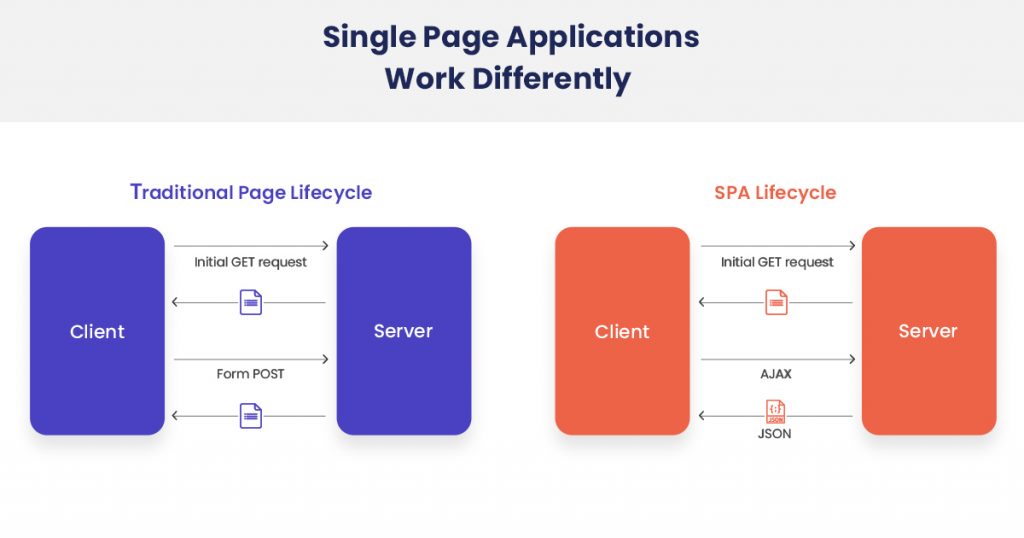Single Page Applications (SPAs). Most Discussed Pros & Cons

Want to know more about single page applications? Starting off with a new web application development project usually starts by deciding if you want to build a single-page application or a multi-page application. While both have their pros and cons it’s a good idea to know in which scenario it would be ideal to use one instead of the other.
In this article, we’ll put single-page applications under the microscope and analyze what they are, how they work, how they compare to multi-page applications (MPAs), and their pros and cons.
So if you are looking to build your own website or app in the near future or if you need to do it for a client, stick around as we have got you covered with all the basics as well as the minute details of single-page applications you need to know.
What are Single Page Applications (SPAs)?

Single-page applications are the more modern type of web application. In single-page applications or SPA all the data, javascript code, and assets like images and content on a page are only downloaded once on the first request. Each subsequent request sent to the server does not load a new page.
This means that every subsequent request sent by a user to the server will not load a new HTML page. A good trick to check if a website is using a single page framework or a multi page framework is to go to a page on the website and click a link to another page on the same website. If you see the spinner on your browser start loading, and a new page opens it means it’s a multi page application. If the content changes instantly without the opening on any new web page, the website is a single-page application.
When the user interacts with a single page application by clicking on a link, for example, the same page is re-rendered and new information is presented to the user dynamically. This presents a much smoother, seamless, and fast user experience. This is just one of the reasons why many companies and businesses prefer to use single page applications rather than multi page applications.
For example, you can see companies like Facebook and Google using single-page web applications. Moreover, platforms like Twitter, Slack, and Trello are all SPAs. There are many great frameworks out there that you can use to develop single-page applications. For example, Angular, React, and Vue.js can all be used for this purpose. If you are unfamiliar with these frameworks consider going for software development services in Baton Rouge to help you out.
What are the Pros of Single Page Applications (SPAs)?
Single page applications have many benefits as well as some drawbacks. Talking about the advantages of using single page applications, we will share a few of the most discussed ones and look at them in detail. Here are the key advantages of using SPAs:
- Fast, instant, hardly any wait time
- Easily debuggable
- Good user experience
- Work offline
- Can be converted to iOS and Android applications
- Uses less bandwidth
1. Single page applications are super fast!
The major advantage of a single page application is that they are insanely fast. There is no lag, the transitions are smooth and all information of the page is presented instantly. This is incredibly beneficial as the user does not have to wait for the page to load when fetching new information. In the case of multi page applications a new page would load a new request to the server which will take more time. Hence many companies are now building single page applications instead of multi page applications because they do not want to compromise user experience. If this is something that you want to achieve with your next custom software development project then single page applications are the way to go.
2. Easily debuggable
Debugging is undoubtedly a routine task of any web development project. You have to make sure your web application is working as intended without any bugs or errors. Debugging single-page applications is much easier as compared to multi page applications. Google chrome provides easy-to-use developer tools for debugging SPAs. Developers can look at a lot of different things using this including the data, network operations, and page elements. You can debug and find out issues quicker as compared to multi page applications are don’t have to sift through hundreds of lines of code.
3. Good user experience
When pages are displayed instantly and all content is made available to the user at once it leads to an enhanced user experience. Using SPA is therefore much more convenient and feels almost as if you are using a mobile app or a native desktop app. The bounce rate would also be lower in SPAs since the user does not have to wait for a long time for something to load. In the case of MPAs, the bounce rate is higher as the user gets frustrated when something does not load quickly and they leave the site. In short user experience suffers.
4. Work offline
Single page applications are capable of running offline as well as everything is downloaded and becomes available right off the bat when the user sends the first request to the server. The server does not have to send the HTML document on further requests, just the JSON data.
5. Can be converted to iOS and Android applications
It is fairly simple to convert single page web applications to iOS and Android applications. Want to make that transition in the possible future? Then you might want to consider having a single page application instead of a multi page application.
6. Uses less bandwidth
Single page applications are lightweight and fast. They can work well even in poor network conditions and use far less bandwidth as compared to multi page applications. This is because web pages are loaded only once on the first time.
What are the Cons of Single Page Applications (SPAs)?
1. SEO for single page applications can be challenging
Search engine optimization (SEO) can be hard in the case of SPAs. The user sees content change dynamically on a SPA but it is hard for crawlers to assess and account for such a change. SEO is all about having multiple search engine friendly pages that bring traffic to your site. With single page applications this is not possible. One page is all you have to work with. Although there are ways to optimize SPAs for search they are way too complex for the layman.
2. Need javascript
Every single page application has a strict requirement for javascript. With javascript, your single page application will not run. If javascript is disabled, a SPA does not work.
3. Favor modern browsers
Single page applications run seamlessly on the latest browsers that support the tools needed for them to run efficiently. The same cannot be said for older, more traditional browsers. In older browsers for example internet explorer perhaps, single page applications may malfunction or refuse to work altogether.
4. Security issues
There are also some security concerns that loom around the use of SPAs. They are more prone to being hacked through cross-site scripting attacks. So you need to keep this in mind if you are deciding to build a single page application for your project. If the security of you or your client’s website is a cause of grave concern for you then you should consider opting for a multi page application to build your site on.
5. Use a lot of browser resources
They are hugely dependent on the web browser. Because of this, there is high usage of browser resources. As discussed previously, single page apps require the need to have some of the more modern and latest types of browsers to work well. On the other side of the divide, multi page applications can work really well on native browsers and don’t use up a lot of browser resources.
Conclusion
It is tough to decide whether to go with single or multi page applications when considering a new web development project. Single page or multi page apps both have their own advantages and disadvantages and you need to prioritize which advantages you need in your project and which disadvantages you need to avoid. This will help you make your choice.
For instance, if you are prioritizing user experience, you should go for single page applications over multi page applications. However, there may well be a scenario where your key focus is on building a secure, SEO-friendly website for your client. In this case, a multi page application would better suit your needs as it would make your search engine optimization efforts simpler and more fruitful, coupled with the fact that they will be more secure and less prone to cyber-attacks.
Have you made your choice yet? Still can’t decide? Try getting in touch with a web application development company to make your job easier. There are many excellent options available out there in this regard and if you don’t have the right software development expertise or a sound web development team on board it’s a good option to have someone else do it for you!

